Malcolm R. Campbell's Blog, page 52
May 22, 2022
Sunday’s mixed bag.
 This peacock is one of our frequent visitors from the farm across the road. He looks for bugs while we’re mowing the yard or soon after. Often has several peahens with him. The focus is a bit off because he was so close I had to take the photo through the dirty windows on the front door.Since I like going grocery shopping on Mondays, Mother Nature likes scheduling the heaviest rains of the month on Monday. Looks like that’s going to be the case tomorrow. Drat.
This peacock is one of our frequent visitors from the farm across the road. He looks for bugs while we’re mowing the yard or soon after. Often has several peahens with him. The focus is a bit off because he was so close I had to take the photo through the dirty windows on the front door.Since I like going grocery shopping on Mondays, Mother Nature likes scheduling the heaviest rains of the month on Monday. Looks like that’s going to be the case tomorrow. Drat. Our unopened backup jar of Jiff peanut butter is included in the batch being recalled. I’m happy we hadn’t opened it yet. I’m unhappy that the solution is to throw it in the trash.Every time I read about the Korean war, I’m stunned by how badly General MacArthur managed the war from Tokyo. He kept saying that the Chinese troops south of the Yalu rive were simply the remains of a regiment that came across the border into North Korea–nothing to worry about. So he sent army and marine divisions up to the Chosin reservoir where they were outnumbered five to one by a massive number of Chinese who were there in strength just waiting for the Americans to walk into their trap–which they did. They were lucky to get out of there to a port city where naval and merchant ships evacuated them.
Our unopened backup jar of Jiff peanut butter is included in the batch being recalled. I’m happy we hadn’t opened it yet. I’m unhappy that the solution is to throw it in the trash.Every time I read about the Korean war, I’m stunned by how badly General MacArthur managed the war from Tokyo. He kept saying that the Chinese troops south of the Yalu rive were simply the remains of a regiment that came across the border into North Korea–nothing to worry about. So he sent army and marine divisions up to the Chosin reservoir where they were outnumbered five to one by a massive number of Chinese who were there in strength just waiting for the Americans to walk into their trap–which they did. They were lucky to get out of there to a port city where naval and merchant ships evacuated them.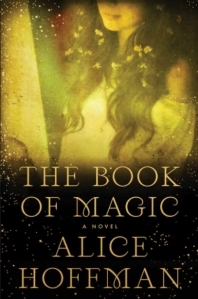 While waiting for Alice Hoffman’s
The Book of Magic
to arrive, I pulled my copy of the 1992 Richard Powers’ novel The Goldbug Variations off the shelf thinking I’d re-read some of it. Hmm, perhaps not. I thought it was weird in 1992 and I still do, so I doubt I can stay with it even though I have no trouble staying with Pirsig and Joyce. In its review, the New York Times said, “In his third novel, Richard Powers is up to something very unusual. “The Gold Bug Variations” is a little bit like Robert Pirsig’s “Zen and the Art of Motorcycle Maintenance,” in that it carries us on a cerebral quest for a philosophical heffalump; it’s a little bit Borgesian in its love of the complex and cryptic; it’s a little bit Joycean in its size and difficulty. It’s a “science” novel, but closer to science fiction in its inventiveness, its hardware vocabulary and software characterization, and in the uncritical pleasure it takes in the purely clever, the nifty.” Maybe I’ll just read cereal boxes for a few days.
While waiting for Alice Hoffman’s
The Book of Magic
to arrive, I pulled my copy of the 1992 Richard Powers’ novel The Goldbug Variations off the shelf thinking I’d re-read some of it. Hmm, perhaps not. I thought it was weird in 1992 and I still do, so I doubt I can stay with it even though I have no trouble staying with Pirsig and Joyce. In its review, the New York Times said, “In his third novel, Richard Powers is up to something very unusual. “The Gold Bug Variations” is a little bit like Robert Pirsig’s “Zen and the Art of Motorcycle Maintenance,” in that it carries us on a cerebral quest for a philosophical heffalump; it’s a little bit Borgesian in its love of the complex and cryptic; it’s a little bit Joycean in its size and difficulty. It’s a “science” novel, but closer to science fiction in its inventiveness, its hardware vocabulary and software characterization, and in the uncritical pleasure it takes in the purely clever, the nifty.” Maybe I’ll just read cereal boxes for a few days.
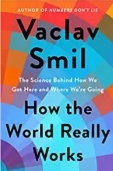 I’m tempted to buy
How the World Really Works
, and since Kirkus says it’s “An exceptionally lucid, evenhanded study of the scientific basis of our current and future lives,” that means I might understand it without a little bit Borgesian complexity muddying the waters. My novels are usually magical realism in style, but I never cared for the work of Jorge Luis Borges. (I do like the music of Muddy Waters. I grew up listening to the blues, not that that has anything to do with Vaclav Smil’s book.)
I’m tempted to buy
How the World Really Works
, and since Kirkus says it’s “An exceptionally lucid, evenhanded study of the scientific basis of our current and future lives,” that means I might understand it without a little bit Borgesian complexity muddying the waters. My novels are usually magical realism in style, but I never cared for the work of Jorge Luis Borges. (I do like the music of Muddy Waters. I grew up listening to the blues, not that that has anything to do with Vaclav Smil’s book.)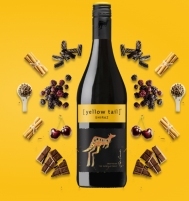 The grocery store nearest my house has a decent selection of wine in the low-price (swill) category, plus a few other red wines that I actually like. However, the store is discontinuing Yellowtail shiraz. This is almost as bad as Outback Steakhouse taking Black Opal Cabernet off the menu. I contacted customer service to suggest that they keep the wine in stock. Yeah no, like that’s going to happen. The wine goes well with steak and typing blog posts.
The grocery store nearest my house has a decent selection of wine in the low-price (swill) category, plus a few other red wines that I actually like. However, the store is discontinuing Yellowtail shiraz. This is almost as bad as Outback Steakhouse taking Black Opal Cabernet off the menu. I contacted customer service to suggest that they keep the wine in stock. Yeah no, like that’s going to happen. The wine goes well with steak and typing blog posts.
May 20, 2022
Myth: you MUST write every day
“What has shifted over the years is that I take a lot more time off from writing. As a younger writer, I was really adhering to the mythology that, in order to be a writer, you have to write every day. As I’ve continued to age and trust that the writing will be there, I’ve moved into a space where I feel like if I don’t write for a couple of months, that’s fine. It doesn’t scare me at all.” – Ada Limón in The Atlantic
If you’re a newspaper reporter, documentation writer, a freelancer on a deadline, or in any other situation where you are working for somebody else, then you might need to write every day. Otherwise, you probably don’t.
 Writing professors and other gurus have for years sounded like a broken record on the “write daily” mandate because (supposedly) if you don’t, you’ll lose your talent and skills, be treating writing as an occasional hobby rather than a job or avocation, heading for the gutter, turning to drink, and other horrid outcomes. I think that’s nonsense.
Writing professors and other gurus have for years sounded like a broken record on the “write daily” mandate because (supposedly) if you don’t, you’ll lose your talent and skills, be treating writing as an occasional hobby rather than a job or avocation, heading for the gutter, turning to drink, and other horrid outcomes. I think that’s nonsense.
But, if you don’t think it’s nonsense and want to write every day, that’s wonderful as long as it’s working for you. I tend to rebel against absolutes and other “necessary” writing habits. For me, such absolutes are harmful because they clash with the way I view my avocation. If such rules clash with your personality and your art and craft, ignore them.
We are unique individuals, those of us who write, and in many cases, we don’t quite know how we do it. But if “how we do it” seems to work, then why corrupt the process by twisting it to fit with how somebody else does it?
I think we do our best writing when we maintain our independence from those who keep handing out “writing rules” and dusty myths as though they’re gospel. We’re not working on an assembly line. It goes without saying (almost) that the work you are doing is your story.
 Malcolm R. Campbell is the author of the four novels in the Florida Folk Magic Series, beginning with “Conjure Woman’s Cat.”
Malcolm R. Campbell is the author of the four novels in the Florida Folk Magic Series, beginning with “Conjure Woman’s Cat.”
May 19, 2022
Manifestos are a dime a dozen but the deaths they cause are real–and tragic
The thugs who commit mass shootings often back up their murders with a manifesto that purports to (a) gain converts and (b) show that their actions were justified.
 According to the Southern Poverty Law Center, “The attack in Buffalo is the direct result of white nationalist propaganda, specifically the ‘great replacement’ conspiracy theory, being promoted and now mainstreamed by major public figures. While this false notion that white people are being systematically replaced by Blacks, immigrants, and Jews has deep historical roots, it has gained traction in recent years. And with that traction has come violence, both physical and political.”
According to the Southern Poverty Law Center, “The attack in Buffalo is the direct result of white nationalist propaganda, specifically the ‘great replacement’ conspiracy theory, being promoted and now mainstreamed by major public figures. While this false notion that white people are being systematically replaced by Blacks, immigrants, and Jews has deep historical roots, it has gained traction in recent years. And with that traction has come violence, both physical and political.”
Such theories, ideas, and notions are not only arrogant but abhorrent. Some people argue that the killers in mass shootings are not insane but have been radicalized by white supremacy propaganda of one stripe or another. My view is that “being radicalized” in this way IS an example of insanity, but splitting hairs about definitions won’t fix the problem. Neither will be banning freedom of speech.
I would like to see more forums, books, articles, TED talks, and other initiatives that promote a dialogue about the inflammatory issues that divide us rather than leaving the entire discussion to Facebook and other threads where is no civility or enlightened attempt to explore what is polarizing us and why such things frighten people to the extent that they take others’ lives and are killed in the process.
We need to develop new ways of looking at the world rather than perpetuating fear and distrust that, if not addressed, will turn our country into an armed camp of competing insanities.
May 18, 2022
Korean War – all but forgotten
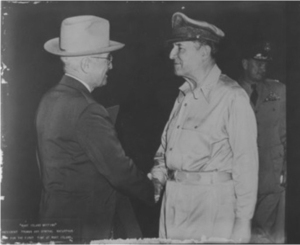 If it weren’t for the insane antics of North Korea’s “Supreme Leader” Kim Jong-un, we would probably never remember that a war–that’s technically not over–divided up the country. I remember the war because it was in the news when I was a child. Little to nothing was said about the war in my history survey courses other than President Truman firing General MacArthur in April 1951.
If it weren’t for the insane antics of North Korea’s “Supreme Leader” Kim Jong-un, we would probably never remember that a war–that’s technically not over–divided up the country. I remember the war because it was in the news when I was a child. Little to nothing was said about the war in my history survey courses other than President Truman firing General MacArthur in April 1951.
Even now, I think most viewers of “M*A*S*H” reruns assume the TV show was set in Vietnam even though the co-authored novel by a M*A*S*H surgeon (under a pseudonym) was based on this wartime experiences in the Korean War.
I research the war from time to time because characters in my novel Fate’s Arrows and in my short story “The Smoky Hollow Blues” (in the recently released Thomas-Jacob anthology The Things We Write) served in Korea. The novel in progress has these same characters, so I find myself wanting to know more about the near-disaster for the U.S. Marines at Chosin Reservoir in 1950.
 You can learn about this battle online on more sites than Wikipedia, and they give a decent overview of the battle. Yet I feel it’s through the lens of somebody watching it from outer space. I can’t afford to buy books about the war just to fill in background information about my characters. Fortunately, I have most of Jeff Shaara’s historical novels including The Frozen Hours about Korea. The novel brings me a close-in view of what it was like to be fighting a superior-in-size Chinese force in sub-zero temperatures where weapons malfunctioned and frostbite was a killer.
You can learn about this battle online on more sites than Wikipedia, and they give a decent overview of the battle. Yet I feel it’s through the lens of somebody watching it from outer space. I can’t afford to buy books about the war just to fill in background information about my characters. Fortunately, I have most of Jeff Shaara’s historical novels including The Frozen Hours about Korea. The novel brings me a close-in view of what it was like to be fighting a superior-in-size Chinese force in sub-zero temperatures where weapons malfunctioned and frostbite was a killer.
I bought the book before I knew I would ever use it as a reference. I like Shaara’s work and probably have most of his novels on my shelf. As an author, I go everywhere I can for background information, and sometimes historical fiction works out very well.
May 17, 2022
Ancestors, I guess we’re stuck with them
My ancestors go back to Scotland’s King Robert Bruce so this long after the problems with England (from a Scot’s point of view) I can’t say anything much about the U.K. other than it would have been much better for all of us if Scotland, Ireland, and Wales had managed to stay independent, and without a doubt, those countries need to break away. My wife, who studied English history in school, is rather astonished that I hate Elizabeth I with an unnatural passion, but I feel she was complicit in a lot of bad things including kidnapping and murdering Mary, Queen of Scots.
I’m not the only ex-pat Scot who’s being influenced by long-ago events. My roommate in college went nuts when he learned he’d been assigned to share a space with a Campbell. He said that hundreds of years ago my clan attacked his clan, killing the innocent and raping all the women. “Would I apologize?” he asked. “No, I said, for we improved your clan immeasurably.” He changed rooms. Good riddance.
But, I digress. I guess my wee dram of Talisker whisky turned into a pint of Talisker. What can I say other than, “Duilich mu dheidhinn sin.”
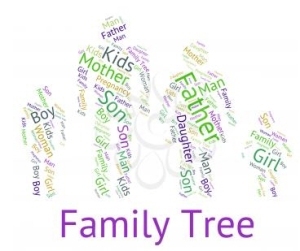 The ancestors that impact my life on a daily basis are more recent. They were farm people, and that’s fine. Being farm people, they ate their evening meal (called dinner except on Sundays when it was called supper) at 5 p.m. Dinner continued to be served at 5 p.m. (or else) even after the farms were sold off and folks moved into town. This habit was passed down to my parents who ate at 5 p.m. even though doing that was falling out of fashion. My wife tells me that her mother (a farm person) and my mother (a farm person) were also “ruined by home ec because it taught them how to cook the kind of meal a farm family would eat along with where all the flatware and glasses and plates and saltshakers should be positioned on the table.
The ancestors that impact my life on a daily basis are more recent. They were farm people, and that’s fine. Being farm people, they ate their evening meal (called dinner except on Sundays when it was called supper) at 5 p.m. Dinner continued to be served at 5 p.m. (or else) even after the farms were sold off and folks moved into town. This habit was passed down to my parents who ate at 5 p.m. even though doing that was falling out of fashion. My wife tells me that her mother (a farm person) and my mother (a farm person) were also “ruined by home ec because it taught them how to cook the kind of meal a farm family would eat along with where all the flatware and glasses and plates and saltshakers should be positioned on the table.
So now I’m hungry at 5 p.m. (You can imagine what kind of hell this caused when I spent a summer in Europe where nobody ate dinner until long after respectable American farm families had gone to bed.)
Since farm families knew better than to swear in public, I don’t swear in public, and still, I find myself pissed off (oops) when I read uncivil comments on Facebook and elsewhere with profanity that was only appropriate in the navy. My ancestors taught me that if you need to swear in public, you: (a) have a limited vocabulary, (b) are scum, and (c) should go to jail. I still believe that even though profanity is often required at home when conversing with the cats.
Early on, I was taught to respect my elders. Yet, those of us who came of age in the 1960s learned not to trust anyone over 30. Since I suspect that my elders, dead or alive, have had too much influence on my life, I tended to respect them less than I should have–unless they were of Scots descent. Even now, people over 30–including me–should be monitored to make sure that haven’t sobered up and/or fallen behind on their meds.
Why? Well, our ancestors (including our parents) have brainwashed us to do what we do. We have no choice. We want to do better, but we don’t know how. My hope is that you discover this influence in your life before it’s too late.
Malcolm R. Campbell wrote “Special Investigative Reporter” even though his ancestors said, “don’t do it.”
May 16, 2022
Why you can’t go home again
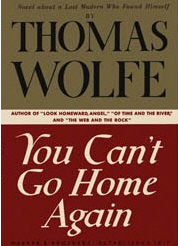 “You can’t go back home to your family, back home to your childhood … back home to a young man’s dreams of glory and of fame … back home to places in the country, back home to the old forms and systems of things which once seemed everlasting, but which are changing all the time – back home to the escapes of Time and Memory.” – Thomas Wolfe in You Can’t Go Home Again
“You can’t go back home to your family, back home to your childhood … back home to a young man’s dreams of glory and of fame … back home to places in the country, back home to the old forms and systems of things which once seemed everlasting, but which are changing all the time – back home to the escapes of Time and Memory.” – Thomas Wolfe in You Can’t Go Home Again
You can’t go home again because the home you knew no longer exists. And even if it did, the you who lived there no longer exists.
I never go to reunions because everyone there is a stranger and so am I.
Home isn’t always a place, the place where you grew up, had a summer romance, first saw the world clearly, or experienced fear and pain that impacted what you have become but not who you were during those moments that call out to you years or decades after the fact.
Home for a writer is often his/her first novel. For me, home has always been The Sun Singer. The novel has one sequel and I had long thought to write another. But I delayed doing that for various reasons. Last year I decided to commit to the project. But it didn’t work. I’m not who I was when I wrote The Sun Singer, nor is the location in which it was set, nor are a thousand other variables that shaped the book and myself when I wrote it. None of those things exist now except in my imperfect memory.
I like a comment from a favorite poet of mine Ada Limón from a May 16 interview in The Atlantic: “We want to grow as artists, as human beings; we want to have more access to the workings of the world. So every book process changes for me, because every book is a new way of looking at the world, and a new me: I’m different every time, though I’m bringing the older self—note I did not say wiser, but older—to the process.”
Not to change, would be stasis. . .as a person, a spouse, an author. We have fresh eyes always. New influences. Experiences that changed us a little or a lot. If I tried to go home, however, I defined that, I would be a stranger in a strange land. The Sun Singer and its sequel Sarabande are as they are (or were) but the “me” I am today didn’t write them.
Change, as the I Ching tells us, is the only constant in the universe. We are better off flowing with it than fighting against it. Nostalgia draws us toward the past, but that past is an illusion, and trying to go there represents a failure to live in the present moments all of which want to have their say in our lives and our work.
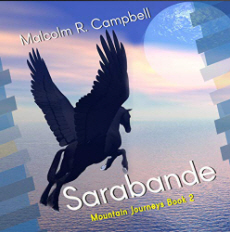
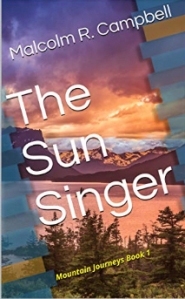 Malcolm R. Campbell is the author of the contemporary fantasies “The Sun Singer” and “Sarabande.”
Malcolm R. Campbell is the author of the contemporary fantasies “The Sun Singer” and “Sarabande.”
May 15, 2022
‘Books may well be the only true magic’ ― Alice Hoffman
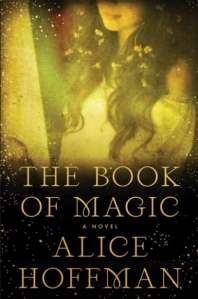 If you read and re-read Alice Hoffman’s novels (possibly with an initial focus on the “practical magic” series that concludes with The Book of Magic from 2021), you might slowly come to believe that books are the only true magic.
If you read and re-read Alice Hoffman’s novels (possibly with an initial focus on the “practical magic” series that concludes with The Book of Magic from 2021), you might slowly come to believe that books are the only true magic.
Some might suggest the magic is within the author and that in ways nobody can know, s/he transmits that magic to the page. Perhaps, but I doubt it. I believe the magic arises in the act of writing and the author only discovers its truth while reading through the manuscript.
One of my favorite Hoffman quotes comes from Practical Magic when Aunt Francis says, “My darling girl, when are you going to realize that being normal is not necessarily a virtue? It rather denotes a lack of courage.”
If one is normal, then s/he doesn’t consider magic at all, and should magic come up in a conversation, s/he will attack it as a scam. I’ve believed this since high school which, no doubt, accounts for the fact that my teachers considered me a troublemaker. I’m not sure “normal” shows a lack of courage so much as a lack of imagination and/or a simultaneous lack of the kind of curiosity it takes to “test the waters” when new ideas come to mind.
Perhaps the basis for a healthy aversion to consensus normality is an open mind. Having a closed mind seems to begin in high school where the goal of many students was “fitting in.” That was the way one became popular or even acknowledged. In The Rules of Magic, we read that ““Other people’s judgments were meaningless unless you allowed them to mean something.” In school, it seems, we became addicted to allowing those judgements to mean everything.
I suppose this herd mentality is built into us. It’s not easy breaking free, though the right books will certainly help (Hoffman, perhaps?).
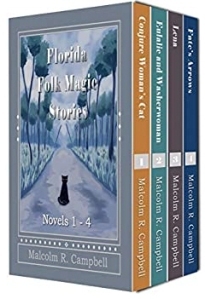 Malcolm R. Campbell is the author of the Florida Folk Magic Series, a 1950s-era story in which the good guys battle the KKK. Save money with the four-novels-in-one Kindle edition.
Malcolm R. Campbell is the author of the Florida Folk Magic Series, a 1950s-era story in which the good guys battle the KKK. Save money with the four-novels-in-one Kindle edition.
May 13, 2022
PEN AMERICA CONDEMNS KILLING OF PALESTINIAN-AMERICAN JOURNALIST SHIREEN ABU AKLEH, SHOT TO DEATH WHILE REPORTING ON THE WEST BANK
FOR IMMEDIATE RELEASE
May 11, 2022PEN America has issued the following statement from Liesl Gerntholtz, Director of the PEN/Barbey Freedom To Write Center, on the killing of Palestinian-American journalist Shireen Abu Akleh: “PEN America condemns the killing of Palestinian-American journalist Shireen Abu Akleh today while reporting from the West Bank. For a journalist with a vest that clearly designated her as a member of the press to be shot in the head while reporting a story is a shocking affront. We call for an urgent, credible, and comprehensive investigation into the circumstances surrounding the shooting—including allegations that the Israeli military deliberately targeted her. Her killing illustrates the dangers faced by journalists all over the world as they do their jobs.”
“PEN America condemns the killing of Palestinian-American journalist Shireen Abu Akleh today while reporting from the West Bank. For a journalist with a vest that clearly designated her as a member of the press to be shot in the head while reporting a story is a shocking affront. We call for an urgent, credible, and comprehensive investigation into the circumstances surrounding the shooting—including allegations that the Israeli military deliberately targeted her. Her killing illustrates the dangers faced by journalists all over the world as they do their jobs.”
Shireen Abu Akleh, 51, had worked for the Al Jazeera network for 25 years.
—
See also: CPJ calls for international probe into Shireen Abu Akleh’s killing in West Bank
“Israeli and Palestinian authorities should ensure that the investigation into the killing of Palestinian American journalist Shireen Abu Akleh is swift and transparent, that all evidence is shared with international investigators, and that those responsible are brought to justice, the Committee to Protect Journalists said Thursday.”
May 12, 2022
The lawn mowing blues
When I was a kid, our family was the last in the neighborhood to buy a power mower. In those days, people argued which was better, the rotary type which you had to push or the self-propelled reel-type which–if set wrong–dragged senior citizens through their yards like a runaway horse. We got a rotary and liked it because it chopped up the pinecones in the yard rather than getting them stuck in the blades.
When we were in high school, a friend with a yard equipment company lent us a John Deere and a trailer to haul it around. We mowed a lot of yards that summer and paid a cut of the action to the lawnmower shop’s owner. Friends who’d laughed at us during our push mower days were envious and we laughed ourselves to the bank.
 On a rural road, one waves at everyone who drives by.
On a rural road, one waves at everyone who drives by.
Now, our property is large enough for several houses and so we have several riding mowers. When they’re working at the same time, we get our grass cut often enough to keep the place from looking abandoned.
When a mower is down, we have trouble keeping up. Our property eats lawn powers. It was a farm until recently and all the cuts of ploughs and harrows, while nothing to a tractor and a bush hog, are a menace to a riding mower. Our mowers ride like bucking horses. That’s hard on them and hard on us.
The aches and pains of old age, arthritis, and otherwise, don’t like riding a bucking horse or mower. So, for several days after cutting the grass, I can hardly move. Or sleep. Or reach down to the floor to tie my shoes or pat the kitties. Then, of course, rain comes, the grass grows, and it’s time to back the mower out of the garage and start the process all over again.
Amy Winehouse once said, “Every bad situation is a blues song waiting to happen.” So, I have to say that this property loves the blues when it’s time to make it look like people actually live here.
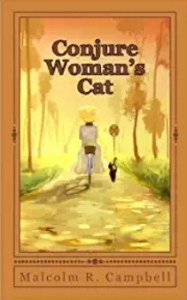 Malcolm R. Campbell is the author of the conjure woman vs. the KKK novel “Conjure Woman’s Cat.”
Malcolm R. Campbell is the author of the conjure woman vs. the KKK novel “Conjure Woman’s Cat.”
May 9, 2022
Sometimes the research makes the novels almost too hard to write
Florida was a violent place of unimaginable racial turmoil during the early-to-mid 1900s, especially in the peninsula, and while I’ve researched this subject numerous times to check on facts for my Florida Folk Magic Series, reviewing all that again now for the novel in progress is making the novel almost too hard to write.
Some incidents are so extreme, that I cannot fathom a person (or mob) doing such things to another person. I need to take a deep breath and step away from this because the details make me sick. While I would never put the worst of them into my novels, I cannot “un-see” them, so to speak.
The worst incidents look like what would happen if the scum behind them read through the “medical” experiments conducted on living people by Nazi SS officer Dr. Josef Mengele, the so-called “Angel of Death.” I refuse to put such details into my work. And, I don’t have to do it because I’m not writing directly about the incident, but about people’s response to such incidents.
Yet, when writing about people fighting the KKK in Florida in the 1950s, it’s difficult to stay away from including characters discussing atrocities that were heavily covered by the press rather like characters in current novels mentioning Russia’s invasion of Ukraine or, say, the highly publicized shooting that takes place in the town where a novel is set. Such references add depth to the novel, I think, by anchoring it in a real-time and a real place, and by showing what the characters think about the events.
 Moore family home in Mims.
Moore family home in Mims.For example, the current novel-in-progress is set in 1955. One of the characters is an FBI agent who has just returned from a follow-up investigation into the assassination of civil rights activist Harry T. Moore in Mims, Florida. Moore’s house was blown up with dynamite on Christmas day in 1951. He and his wife were killed, and this we might say was the first assassination of an active civil rights leader. Florida would conduct multiple investigations for over fifty years. It appears that the perpetrators died of natural causes (and one suicide) before the initial FBI investigation ended.
I have to mention Moore in my novel. The problem, during the research phase, is that the bombing of Moore’s house is tangled up with other central Florida racial crimes. So, one sees a lot that one doesn’t want to see. I’m happy that most of it isn’t relevant to the plot of the novel. Yet, I still need to take that deep breath and maybe a Xanax and/or a glass of Scotch. You can learn more about Moore and his legacy here.
Those of us who research the past ultimately run into the very things we don’t want to see. That’s when we have to become editors and weed out the worst of the worst when it’s not on point to the story we are telling. Those who want to know more can follow our references to the greater truths.
The humanity within us calls upon us to do better. A writer can tell a story in which the protagonist triumphs over evil, or at least makes things better. That’s harder to do in “real life.” But we have to try, don’t we?




